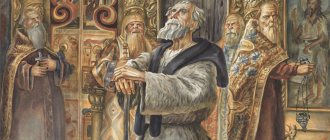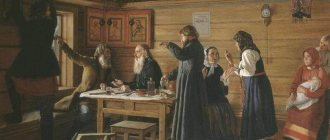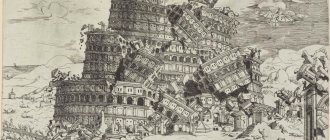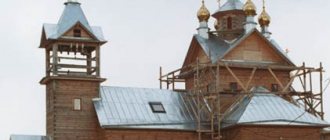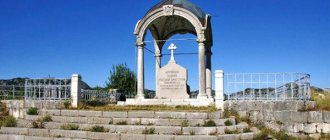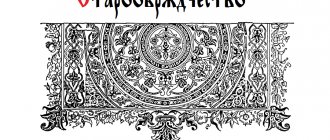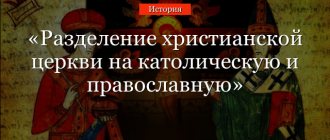Son of a priest Avvakum Petrov
On November 25, 1620, in the village of Grigorovo in the Nizhny Novgorod region, a boy was born into the family of priest Peter Kondratyev. In honor of the Old Testament prophet, he was named Habakkuk. The book “The Life of Archpriest Avvakum, Written by Himself” contains individual episodes from his early years. Avvakum said about his father: “My father lived a weak life, diligently drinking intoxicated drinks...”.
When the boy was 12 years old, his father died - the teenager had to take on the role of head of the family. After the death of his mother, he married fellow villager Anastasia Markovna, who until her death accompanied him in all the hardships and hardships.
Archpriest Avvakum. (pinterest.ru)
In 1644, Avvakum began services at the Church of the Nativity of Christ in Lopatishchi. Children appeared in his young family - a son and a daughter. The congregation generally liked his furious and sincere speeches during his sermons, but there were also fights - the priest was beaten by ill-wishers.
The local authorities' dissatisfaction with Avvakum's activities forced him and his family to seek protection in Moscow. The capital greeted him cordially, there he fell into the circle of leaders of the “God-loving” movement - clergy who advocated reforms of the church organization and its cleansing from abuses. The priest met not only the royal confessor Stefan Vnifatyev, but also the sovereign Alexei Mikhailovich himself. In September 1647, Avvakum returned to Lopatishchi with letters from the tsar. The home was ruined - we had to rebuild the household from scratch.
Since 1645, the position of the circle of “God lovers” has been strengthened. Father John Nero became the main inspirer of Habakkuk. Nikon (Nikita Minov) also joined the “God lovers”. And in 1647 the circle received the support of the tsar.
Where's the justice?!
The book of the prophet Habakkuk begins with a conversation with God, strikingly consonant with what many of our contemporaries have today. How long, Lord, will I cry, and You will not hear, I will cry out to You about violence, and You will not save? Why do you let me see villainy and look at disasters? Robbery and violence are before me, and enmity arises and discord arises. As a result, the law has lost its force, and there is no correct judgment: since the wicked overcomes the righteous, then a perverse judgment occurs (Hab 1:2-4).
This cry is as old as the world, and the questions are eternal. It seemed to Habakkuk, like at times to all of us, that the Lord was in no hurry to respond to people’s troubles and pain. How good it would be if virtue were crowned with prosperity, and evil was immediately punished! But evil triumphs, but truth and the righteous are persecuted. How to combine this with God's justice?
Habakkuk almost “accuses” God: why are you making me, weak and sinful, a witness to disasters - because this makes me feel bad?! And it’s even worse from the thought that you yourself are enduring all this evil. How can we fit this into our consciousness? And in response to all these sorrowful questions he hears... terrible news about a new disaster coming to Judea.
It turns out that God’s indifference to what is happening on earth is apparent, and He is ready to bring judgment on the unworthy generation of His chosen people. But this judgment will be carried out by the hand of the Chaldeans-Babylonians. Invincible aggressors, they hardly understood that they owed their victories not to their military talents, but to the omnipotence of God, who chose them, like the Assyrians before, as an instrument of His rage - to admonish the nations.
God will not leave sin unpunished - not only in Israel, but also among her enemies. The stones of the walls will cry out, and the beams of wood will answer them: “Woe to him who builds a city with blood and builds fortresses in wickedness!” <...> Woe to you, who serve your neighbor drink laced with your malice and make him drunk so that you can see his shame! You are fed up with shame instead of glory; Drink and show your shame, and the cup of the right hand of the Lord will turn to you and the shame will be brought to your glory (Hab 2: 11–12, 15–16).
Church schism of pre-Petrine Rus'
At the request of John Neronov, Avvakum was appointed archpriest of the Cathedral of the Entrance of the Gospolnya into Jerusalem in Yuryevets-Povolsky. In July 1652, the archpriest arrived in Moscow, where he remained until August 21, 1653.
Meanwhile, the church reform of Nikon, who ascended the patriarchal throne in 1652 and immediately announced the need for changes in religious life, was unfolding in the country. Nikon’s views did not find support among the “God-lovers” who did not agree with the unification of the Russian Church with the Greek. Opponents of the changes fell into disgrace: Father John Neronov was one of the first to come under attack. Archpriest Avvakum even sent a petition to the king, asking for his mentor. Habakkuk himself was also criticized: he had to leave his place of service with part of his flock.
Church schism. (pinterest.ru)
“The priests of Kazan did not let him into the church and kicked him out of the chapel, on the orders of the archdeacon, they say. And I, a sinner, remembered the expulsion of the great luminary Chrysostom, and gathered with my brethren in the Lord in your house in dry land, after you, on the first resurrection, I was vigilant... And at that time a spirit came from the desert, surrounded us with many psyches, and a host of evil ones surrounded us, and Boris Neledinsky jumped into the prayer house with the archers and asked for books, and they began to beat me by the back and tear my hair in my patrahel, and the brothers also intercepted me, a man of forty or more,” wrote Avvakum in “Life.”
Miloradovich S. D. “Avvakum’s travels across Siberia”, 1898. Source: ru. wikipedia.org
On September 15, Avvakum was supposed to be cut for disobedience to the patriarch, but at the personal request of the king, this did not happen. The archpriest was sent into exile in Tobolsk. There, his relationship with the local clergy and governor Pashkov did not work out at all against the backdrop of sacrifices and hardships during the development of the Far East. Thus, during the expedition to Dauria in 1656, Avvakum burst out with fiery speeches and committed several daring antics, for which the disgruntled governor ordered the priest to be beaten with a whip and even put in prison. During the expedition, the archpriest lost his young son.
Boyarina Morozova visits Avvakum in prison. Miniature from the 19th century. (en.wikipedia.org)
In May 1664, Avvakum and his family arrived in Moscow. Opponents of Nikon's reform from among the boyars accepted the disgraced archpriest. The sovereign himself placed Avvakum in the courtyard of the Novodevichy Convent. Gradually, the archpriest gained a large number of supporters of his sermons in Moscow. Ivan Andreevich Khovansky, Yuri Dmitrievich Dolgoruky, Anna Petrovna Miloslavskaya and Feodosia Prokopyevna Morozova - these influential representatives of the Russian nobility supported Avvakum.
Surikov V.I. “Boyaryna Morozova.” (tretyakovgallery.ru)
Fiery speeches that worried the tsar, conflicts with Greek clergy and the dissatisfaction of a number of Moscow clergy forced the sovereign’s entourage to once again expel Avvakum from Moscow. This time - to Pustozersk. Church opposition was subjected to repression.
In 1666-1667, the Great Moscow Church Council was held, which was supposed to reconcile supporters and opponents of reforms. Avvakum was also brought from exile. “The power that has competed with me a lot from the Scripture: Hilarion of Ryazan and Pavel of Krutitsky, but Pitirim, like a red girl, will be silent,” he just sighs. She could not stand against the wisdom and power of Christ, but only reproach. And Paul barked at me and sent me to the devil,” - this is how, according to the Life, a council was held for the archpriest.
Archpriest Avvakum: medieval consciousness and consciousness of modern times
Lecture 6 of 8
How the autobiography of a schismatic expressed the contradictions of the era
Author Olga Chumicheva
Archpriest Avvakum Petrov is an almost incredible figure. This is a unique case when one person reflected the era that separated medieval Russia, predominantly religious, and a new secular state with a culture and political structure of a different type. And if we turn to the figure of Habakkuk, it is largely because he turned out to be a man on the verge of two worlds.
The beginning of his life and the environment from which he came were very ordinary, but the scale of his personality, awareness of his mission and indestructible faith made him the personification of one of the turning points in the history of Russia. Avvakum is unique because before him no one declared himself so definitely and eloquently - after all, he is the author of the first autobiographical narrative in Russian literature, and before him we do not hear such confession. But the question is: how much is a confession, and how much is a game? And why was the “lonely voice of a man” heard by his contemporaries and descendants?
Habakkuk's ability to translate his beliefs into words and actions is amazing. However, he reflects many key features of the Russian man of that era, and, paradoxically, this extreme “typicality” made him a leader in the eyes of his contemporaries and forces us to follow him and gradually, step by step, restore the meaning of events, the scale of which goes far beyond the framework of an individual human life.
The son and grandson of rural priests, he was born in the village of Grigorov, near Nizhny Novgorod - in those primordially Russian, indigenous lands, from where, a decade before his birth, the people's militia had previously emerged to save the fatherland and strengthen the Orthodox faith; a militia that ultimately ensured the accession to the throne of the new Tsar Mikhail Fedorovich Romanov and with him a new dynasty. Avvakum grew up in an ordinary, not very prosperous family: at the age of 15 he lost his drinking father; listened to the instructions of his “prayerful” mother, on whose instructions at the age of 17 he married 14-year-old orphan Nastasya Markovna (that’s what he called her, respectfully, later all his life). At the age of twenty, he was ordained a deacon, and a couple of years later, in 1644, he was ordained a priest and received a parish in the village of Lopatitsy not far from the revered Makaryev Zheltovodsk Monastery. In a word, in the first 25 years he did not stand out in any way from hundreds of “popovichs” like him. Having imagined it, we simultaneously see tens of thousands of young people of the 17th century, for whom life was built according to the patterns of their fathers and grandfathers, who lived within the framework of the church annual circle and held tightly to the earth: “where he was born, he was useful there” - this is their view of world.
However, already in his first arrival, Avvakum gets involved in a struggle that forever determined his life path. He takes an extremely strict moral and canonical position, in accordance with the ideals of Christianity, which were rarely embodied in that “sinful world” that all Russian scribes invariably talk about. He introduces unanimous singing in his church instead of the widespread polyphony (when the priest and deacon read different texts in parallel, shortening the service time to the relief of the parishioners); carefully observes all the regulations, shames and incriminates villagers and even local influential persons for various everyday vices, especially drunkenness. And when “dancing bears with tambourines and domras” come to Lopatitsy, Avvakum, as he later said, “jealous for Christ, drove them out and broke the hares and tambourines from many and took away two great bears - one was bruised ... and released the other in field".
In 1648, Avvakum flatly refused to bless the young aristocrat Matvey, the son of governor Vasily Sheremetev, despite the latter’s merciful attitude towards the stern priest. Naturally, Avvakum got the worst of it from the dissatisfied: they either beat him, then “crushed” him, or the enraged Sheremetev threw him into the Volga, so Avvakum barely escaped. It ended with Avvakum having to flee twice from Lopatitsa to Moscow, from there he was sent to serve as an archpriest (that is, a senior priest) in the city of Yuryevets, where he so fiercely set about establishing piety that after just eight weeks “the priests and women whom he had dissuaded from fornication, in the middle of the street they beat him with a batog and trampled him and threatened to kill him completely... and throw his body into the ditch for the dogs.” As a result, in 1651 he flees from the embittered flock to Moscow.
All this might seem strange and random if it had not happened in the country in the 1640s. After the Time of Troubles and with the advent of the new Romanov dynasty to the throne, many scribes and not only nobles, but also ordinary people were worried about the purity of the faith and feared that deviation from it would lead to the destruction of the Russian land. This also occupied the pious young Tsar Alexei Mikhailovich. The royal confessor Stefan Vonifatiev, the young archpriest of the Kazan Cathedral in Moscow Ioann Neronov, the book collectors Ivan Nasedka, Shestak Martemyanov, and for some time the elderly Patriarch Joseph, tried to revive the ancient tradition of preaching, introduce unanimity, and cleanse the service from the damage that had accumulated over decades of historical upheavals and centuries of previous disunity, to unify church books. The ideal of a pure and righteous church was not close to everyone, but influence on the king allowed the “zealots of ancient piety” to determine spiritual policy.
So the young village priest Avvakum was not a lonely eccentric. He was one of the ardent supporters of a popular and influential movement in the church. And this allowed him to quickly rise in the informal hierarchy of spiritual authorities and establish a personal acquaintance with the king. The unification of liturgical books and rituals was carried out according to modern Greek and Ukrainian publications. Old Russian manuscripts, which required painstaking work and many months of labor, were put aside. And Habakkuk expressed his protest louder and more decisively than like-minded people in letters of petition to Tsar Alexei Mikhailovich. However, he trusted the young priest, and then Patriarch Nikon, and was also interested in strengthening ties with the Ukrainian lands, and needed the support of the Orthodox Cossacks there. So, despite all the personal favor of the Tsar, and moreover, the pious Tsarina Maria Ilyinichna Miloslavskaya, Avvakum could not influence the situation: practice little by little took precedence over the ideal of conservatism.
In September 1653, he was put in the basement of the Andronikov Monastery for three days, and then they began to admonish him. But the more pressure was put on him, the more strongly Avvakum believed that he was right.
However, in those years Avvakum was not a leader in his circle of like-minded people. It was a powerful spiritual movement in defense of the conservative foundations of spiritual culture - and its sharpness and strength were a response to new trends that were latently maturing. At that moment no one could define them, but in essence it was the penetration of secular culture and a secular attitude to life that caused a colossal response. And Tsar Alexei Mikhailovich at that moment felt not just a ruler, but a spiritual leader of society. That’s why he gathered around himself sincere and integral adherents of traditions. However, practice turned out to be much more difficult than ideal. The furious indignation of people of different classes, which Avvakum describes, is not accidental: proclaiming tradition, he and his like-minded people, right up to the tsar, began a set of conservative reforms, trying to adjust the motley and largely secular society to the book standard of Christian piety.
The turning point was 1652: Patriarch Joseph died, Nikon, also born in the Volga region, studied at the Makaryevsky Monastery, a close comrade of the “zealots of piety,” became the new head of the church. Naturally, Avvakum and the others had high hopes for Patriarch Nikon. Quite quickly it became clear that Nikon and his former associates had different understandings of the goals and essence of the cleansing of the church. Yes, they agreed that books, the practice of worship and much more needed to be reformed, but that was where the agreement ended: “... we see that winter wants to be, the heart is cold, and the legs are trembling” - this is how Habakkuk summed up the mood in the circle of friends.
The new energetic Patriarch Nikon relied on immigrants from Ukraine and learned Greeks, but all of them seemed to the traditionalists to be people of dubious morality and suspicious scholarship - somehow too Western, too “Latin”, and for centuries they had learned to fear this.
“...They reproach me,” wrote Avvakum, “for not submitting to the patriarch, but I scold and bark at him from the scriptures. ... They pull you by the hair, push you in the sides, trade you for your neck, and spit in your eyes.” As a result, Avvakum Petrov was exiled to Tobolsk, where at first he was greeted as a true hero. However, even there, a series of quarrels with the archbishop, local clergy and secular officials led to the fact that from Tobolsk - a well-equipped, quite prosperous city that served as the administrative center of Siberia, Avvakum was sent further - to Yeniseisk, and then to Transbaikalia. A detachment headed by the first Nerchinsk governor Afanasy Pashkov, sent to conquer Dauria, a region further east of Transbaikalia, went there.
And here we must stop and take a closer look: where did Avvakum end up, among what people did he end up? The Siberian Khanate was officially captured by Russian Cossacks led by Ermak Timofeevich in the 16th century - almost a century before Pashkov’s campaign, however, not all territories were developed by the military and merchants, relations with local peoples were extremely difficult: some welcomed the Russians as rivals of the Tatars, others they did not want to see new contenders for power. Large tribal unions, which were conditionally subordinate to the Tatar khans (for example, the Yakuts and Tungus), resisted especially fiercely. The arrival of Russian governors was accompanied not only by opportunities to trade, but also by the establishment of a new tribute - yasak.
Pashkov and his comrades were stern people and accustomed to discipline, they were faced with great practical tasks, and the exiled archpriest was an outright burden on this campaign. Avvakum himself had little interest in Siberian affairs, including climatic difficulties, but from his stories one might think that the whole campaign was started as a torment against himself. Although it’s not easy to say who tormented whom more. And when Avvakum began to teach the governor, he simply drove the archpriest, his wife and children from the ship (plank) and sent them on foot. And they actually walked along the shore for a while, and then got back on board. Then Pashkov ordered the obstinate priest to be flogged with a whip and thrown into the Bratsk prison. In fact, Pashkov would have treated anyone who refused to obey his orders on the campaign this way. But Avvakum sees in the actions of the governor personal hatred and the machinations of dark forces. Avvakum describes his prison time with an abundance of diminutive suffixes, creating an ironic effect - childish, almost affectionate speech is in sharp contrast with everyday horrors:
“Like a dog lying in straw: if they feed you, if not. There were a lot of mice: I beat them with a skufi - and my father wouldn’t let me! He was lying on his belly: his back was rotting. There were a lot of fleas and lice.”
In the spring, the detachment moved further - to Baikal and Transbaikalia, it was not easy for everyone. The horror is that a family, including small children, walked with the archpriest, and not all children survived these ordeals. So, despite the apparent “fun” of the story, life was truly scary. And throughout his six years of wandering around Siberia, Avvakum tirelessly denounced the “untruths” of the ill-fated governor. They really tormented each other with uncontrollable ardor. However, it is to Avvakum that we owe a vivid portrait of a military man of the 17th century, the conditions for the development of a new region - that is, sketches of a key process in the formation of the future Russian Empire.
Finally, in 1663, Avvakum was returned to Moscow. The return journey lasted three years. The archpriest “screamed throughout all the cities and villages, in churches and at auctions, preaching the word of God, and teaching and denouncing godless flattery,” that is, the reforms of Patriarch Nikon, who by that time found himself in disgrace. The matured tsar did not tolerate the patriarch’s claims to supreme power, and the matter inevitably led to Nikon’s departure. The Church finds itself in an incomprehensible position: on the one hand, the initiator of the reforms is already in exile, but the reforms are unfolding further; many champions of traditions receive noticeable relief and hope for a turn back, go to the capital, but they are little listened to at court.
During the first months in Moscow, Avvakum triumphed: the enemy was defeated, he himself returned as a martyr and confessor, and friends and disciples gathered around him. The tsar ordered the archpriest to be settled in the Kremlin courtyard, sometimes asked for his blessing, and following the tsar, the boyars and senior service ranks showed respect for Avvakum, especially dear after the Siberian torments. It soon became clear that the tsar did not intend to cancel the reform and Avvakum’s conflict with the authorities became inevitable. Neither side was going to retreat.
We see here a collision of two polar attitudes. For the tsar and his entourage, the main issue was “big politics”: the development of Siberia, strengthening of the western borders, expansion of territories, transformations in the army and government of the country. And church reform was part of this process of unifying the country and strengthening the sovereign power. For Habakkuk, the main thing was personal conscience, which only God could judge. It is no coincidence that his stories about political and personal trials are combined into a single whole in the text of the “Life”, from which, in fact, we learn about all these events and Avvakum’s attitude towards them.
And when the archpriest went ahead - in a Volga village, in the capital, in the Trans-Baikal region, in disputes with the tsar, the governor, the patriarch, friends and enemies, he did this out of the deepest conviction that for a person of any rank there is nothing more important than faith. More than once in “Life” he admits how he sometimes wanted to live quietly with his wife and children, how humanly and from the heart he loved Tsar Alexei Mikhailovich - not because he was a tsar, but because he knew him from his youth, perceived him almost as a friend. There was no servility or profit-seeking in this love. And the king, undoubtedly, understood this - it was no coincidence that he forgave a lot to the obstinate and not at all well-born priest. And yet politics took precedence over faith.
In 1664, Avvakum was exiled to Mezen, where he continued his preaching and supported his followers scattered throughout Russia with messages. A year and a half later, in 1666, he was brought to Moscow for a church council called to elect a new patriarch and finally resolve the issue of reform.
There, on May 13, after futile exhortations, Avvakum was defrocked and solemnly, in the Assumption Cathedral, anathema was imposed on him, accusing him of schism. In response, Avvakum did not remain silent - and announced that he was cursing the bishops, the heads of the Council. Avvakum's story about the events of those days is very colorful. He explains in detail his words, the words of the priests, he talks about the actions that took place. And among other things, he poses a problem that is very important for Russian people of the 17th century: the problem of foolishness and a special attitude to power:
“Yes, they started pushing and hitting me; and the patriarchs themselves rushed at me, about forty of them, I guess it was - a great army of the Antichrist had gathered! Ivan Uarov grabbed me and dragged me. And I shouted: “Wait, don’t hit me!” So they all jumped back... And I walked away to the door and fell on my side: “You sit, and I’ll lie down,” I tell them. So they laugh: “The archpriest is a fool!” and does not honor the patriarchs!” And I say: “We are ugly for Christ’s sake; You are glorious, we are dishonest; You are strong, but we are weak!”
And in this affirmation of weakness, which is higher than strength, lies the most important meaning of the internal rebellion that the archpriest affirms.
After the Council, he was taken to the Pafnutiev Borovsky Monastery, where he was kept in prison “in the glands” for about a year. Avvakum's popularity as a priest and spiritual mentor was so great that both in the royal family and in the boyar chambers there were many intercessors for him. They tried to persuade him, they brought him to Moscow, to the Chudov Monastery, for new meetings with the ecumenical patriarchs and Russian bishops. But he firmly stood his ground: all the churches retreated into wickedness, Nikon’s reforms were evil, the Greeks lost their kingdom under the blows of the Turks precisely because of their unstable faith, and it was better to remain alone with the true faith than to join the “darkness of the lawless.” In the end, he was beaten with a whip and in 1667 he was exiled to the North, to the Pustozersky prison on the Pechora River. The only mercy for Avvakum was that, unlike his Pustozersk convicts, the priest Lazar and the Solovetsky monk Epiphanius, his tongue was not cut.
Avvakum, Lazar, Epiphanius and Deacon Fedor spent the next fourteen years in an earthen prison in Pustozersk, from where, with great difficulty, using the sympathy of a number of archers from among the guards, they sent out teaching letters to supporters of the old faith, strengthening and comforting them. And despite the wave of severe repressions, there were many such people, and of different ranks: from the well-known noblewoman Feodosia Morozova to peasants, archers and merchants. And after the death of Tsar Alexei Mikhailovich, under his son Fyodor Alekseevich, who tried to put an end to the Old Believers, Pustozersky prisoners were burned in a wooden frame. This happened in 1682.
It must be said that it was the end of the 17th century that was marked by major persecution of the Old Believers. If under Alexei Mikhailovich they were rather exhorted and given the opportunity to leave their homes and go to distant lands, then under Fyodor Alekseevich they tried to force them to accept a new faith. And this led to such terrible phenomena as the voluntary self-immolation of people who preferred death by fire rather than submission to dishonor. At the same time, there were serious debates about how to act in relation to the government, which shows excessive cruelty. Waves of softening and tightening policies towards the Old Believers continued until the reign of Peter I, during which they gradually faded away. And even then a more or less standard system was established, when Old Believers, for example, paid a double tax for the right to wear a beard. But otherwise they were left with their faith and the physical persecution at least stopped.
The text of the “Life” and the messages of Habakkuk is filled with incredible optimism. But this is a special kind of optimism: Habakkuk accepts and welcomes trials, perceiving them as a sign of divine chosenness. He is convinced that God accompanies him along the entire path, guides him into the rapids in order to strengthen him in faith and help others see its invincibility. God in the “Life” of Habakkuk feeds his servant - through prayer he “stuffs” his nets with fish, relieves him of the cold, helps him find shelter, and find a way to write to like-minded people. In full accordance with the hagiographic canon, Avvakum also includes demonic forces in the narrative - demons grab him, play the buffoon's pipes, but he bravely disperses them, as befits a saint. The deliberateness of the images, the outright foolishness when Avvakum, in his own words, in a dispute with the bishops suddenly falls on his side at the Council, portrays a fool, thereby playing out the Gospel contrast between ostentatious and true wisdom - all this was at the same time a literary text and a terrible one. a painful life-long performance, prophetic in spirit, addressed to the flock as a sermon, and a spontaneous impulse. It is hardly possible to draw a line between these three components.
Avvakum's story is based on facts - almost all of them are confirmed by documents. And at the same time, simple everyday events, actually spoken words are transformed in the “Life” into a journalistic and artistic whole, because the author gives everything a special meaning and builds a system of logical connections. He turns his life into a public performance, a living testimony of faith. And even the warmest human moments: joy addressed to one’s own child, tender intonation in a story about one’s wife - serve this higher purpose. The simplicity and commonality of feelings emphasizes the magnitude of spiritual achievement, the overcoming that is necessary on the path to salvation. And the vernacular, colloquial expressions that abound in the narrative are constantly intertwined with hidden book and, above all, gospel quotations. For example, he writes:
“The mountains are high, the wilds are impenetrable, the cliff is made of stone, like a wall, and it’s enough to make one’s head shake! In those mountains there are great snakes; Geese and ducks hover in them - red feathers, black crows, and gray jackdaws; in the same mountains there are eagles, and falcons, and merlins, and Indian smokers, and women, and swans, and other wild ones - a lot of them, different birds. Many wild animals roam on those mountains: goats, deer, bison, elk, wild boars, wolves, wild sheep - in our eyes, but we can’t take them! Pashkov drove me to those mountains, to soar with animals, and with snakes, and with birds. And I wrote him a small piece of writing, the beginning: “Man!” Fear God, who sits on cherubim and gazes into the abysses, the heavenly powers and all creation from man tremble, you alone despise and show inconvenience."
Thus, the description of Siberian nature suddenly becomes an illustration of the Gospel text and the teaching-sermon addressed to the governor Pashkov.
The personality and life of Habakkuk become a metaphor and a guiding sign for other people. And this is a game and not a game, this is not just a “theatricalization of life” and is far from naivety. This is following the absolute model - the life path of Jesus Christ, imitation of his passions and sufferings, his parables, love for his disciples and severity towards the Pharisees. In essence, this is a medieval model, but in the life and text of Avvakum it is expressed through the reform of the literary language, through the uniqueness of fate, through extreme fearlessness and willingness to change a lot, sacrifice a lot in the name of preserving and saving the main thing - the fragile and indestructible human soul.
And here we are faced with a problem that is difficult to solve. We constantly talk about old and new, about traditionalist Old Believers and secular innovators. But we run into contradictions. The defenders of antiquity boldly reformed reality, turning it toward the ideal, as did the figures of the European Reformation, who raised the ideal of early Christianity above everyday life and concessions to “human weaknesses.” And the reformist, unyielding spirit was stronger in them than in the champions of novelty. It is no coincidence that the leading industrialists of Russia in the 18th–19th centuries, bold reformers of the economy, later emerged from the “conservative” Old Believer environment: merchants and entrepreneurs, often former peasants, who did not lose their moral principles and firm faith, even becoming millionaires. The conservative Avvakum carried out a revolution of language - with his “bluttering”, colloquially crushing the canons of book style. For another century and a half after him, no one will be able to describe people and everyday scenes so vividly and vividly. Moreover, this is not the naivety of the narrator - it is a fusion of book images, plot models of the past, personal and author’s views. Spoken language intertwines with bookish language organically and skillfully.
And what is most striking is that Avvakum, so medieval in aspiration, introduced into Russian culture an example of a personality capable of overcoming obstacles. And in this power, in the freedom of thought and speech, there is a harbinger of a new, secular culture, challenging both the conservative foundations of society and bureaucratic depersonalization. Habakkuk introduced a role model not of a rebel with a weapon in his hands, but of a thinking person with mature freedom of conscience, ready to pay for it with his life. And with all the turns and changes of mood in society, for centuries we turn to this man, who stepped from the Middle Ages into the Modern Age and taught us to think and speak independently.
Habakkuk's last link
On May 13, 1666, Avvakum was stripped of his hair and anathematized, despite the intercession of the queen. The archpriest was chained and put in a cage. In 1667, Avvakum and a number of his disrobed supporters were sent to the Pustozersky prison. For 14 years he lived in an earthen prison. Even under such conditions, he did not stop preaching and sending messages to both the king and his supporters. There he worked on his autobiography.
Myasoedov P. E. “The Burning of Archpriest Avvakum”, 1897. (ru.wikipedia.org)
At the insistence of Patriarch Joachim, the Pustozersky sufferers, schismatics, should have been sent to the stake. On April 14, 1682, Habakkuk was sentenced to be burned. When the flames blazed, the archpriest managed to free his hand and say before his death: “If you pray with such a cross, you will never perish!”
What? Where? When?
Reliable information about the life of the eighth of the twelve minor biblical prophets, who predicted the destruction of the Jerusalem Temple and Jerusalem itself by the Chaldeans, the Babylonian captivity of the Jews, the return of captives to their homeland and the coming of the Messiah, has not been preserved.
According to Jewish tradition, Habakkuk’s mother was a Shunammite (a native of the city of Sonam - Ed.), whom the prophet Elisha predicted that in a year she would embrace her son. And in the biography of the prophet, which has come down to us in different editions, it is said that Habakkuk was the son of a certain Asaphat from Bethozer, survived the capture of Jerusalem and died just two years before the Jews returned from captivity.
The place of his preaching is considered to be Judea, possibly Jerusalem, during a period of “extreme aggravation of the international situation” and social decay in Judea itself.
